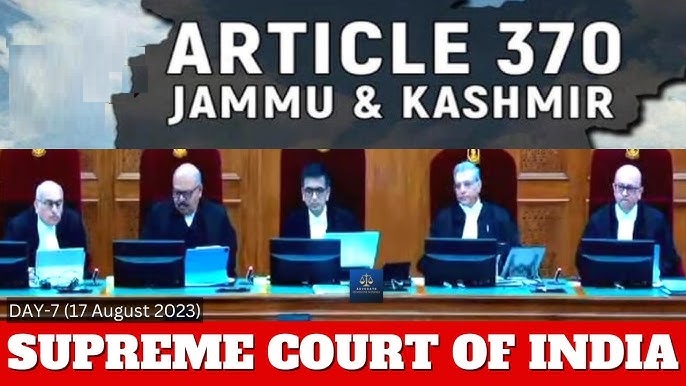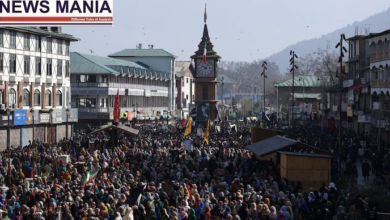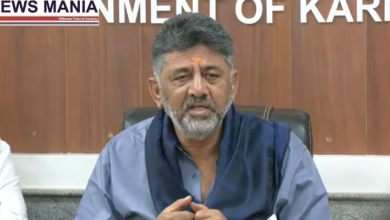
In a significant development, Solicitor General Tushar Mehta apprised the Supreme Court on Tuesday about the Union government’s intention to reinstate the statehood of Jammu and Kashmir (J&K), while maintaining Ladakh’s status as a Union Territory. The assurance came in response to a query from Chief Justice of India (CJI) D.Y. Chandrachud, who emphasized the importance of restoring democracy and sought clarification on the timeline for the restoration.
During the hearing, Tushar Mehta stated, “I have taken instructions. The instructions are that Union Territory is not a permanent feature. But I will make a positive statement the day after tomorrow. Ladakh will remain a Union Territory.” This clarification underlines that while the status of a Union Territory may not be permanent, the commitment to maintain Ladakh’s current designation remains firm.
The Chief Justice posed a critical question to the Solicitor General, highlighting the significance of time-bound actions. He expressed the understanding that matters concerning national security and the nation’s preservation are paramount. However, he sought clarification on whether a definite timeline exists for the restoration of Jammu and Kashmir’s statehood.
The judicial bench had previously requested Attorney General R. Venkataramani to investigate the suspension of Zahoor Ahmad Bhat, a senior lecturer in political science. Bhat’s suspension had occurred merely four days after he had argued against the abrogation of Article 370 by the Central Government. Justice B. R. Gavai raised concerns about the suspicious timing of Mr. Bhat’s court appearance and subsequent suspension order.
On August 5, 2019, the Central Government took a pivotal step by revoking the special status of Jammu and Kashmir and dividing it into two Union Territories. The abrogation of Article 370 marked the end of the region’s special constitutional provisions. Consequently, numerous petitions challenging this decision, along with the Jammu and Kashmir Reorganisation Act, 2019, were referred to a Constitution Bench in the same year.
The forthcoming positive statement from the Solicitor General indicates a willingness on the part of the Union government to address the concerns surrounding the restoration of Jammu and Kashmir’s statehood. This development is poised to have a far-reaching impact on the political landscape of the region, aiming to bring back democratic governance.
The distinction between the status of Jammu and Kashmir and Ladakh reflects a nuanced approach. While Jammu and Kashmir are set to regain their statehood, Ladakh’s Union Territory status remains unchanged. This differential treatment could stem from unique geopolitical and demographic factors that influence the administrative requirements of each region.
The assurance of statehood restoration aligns with the sentiments of many who have been advocating for a return to normalcy in the region. It underscores the government’s commitment to fostering democratic values and inclusive governance. However, the absence of a precise timeline leaves room for speculation and raises questions about the specific steps that will be taken to achieve this objective.
As the nation waits for the Solicitor General’s forthcoming statement, it is expected to shed light on the government’s roadmap for reinstating the statehood of Jammu and Kashmir. Clarity on the approach and the approximate timeline for this transition will be essential in assuaging the concerns of various stakeholders, both within and outside the region.
The Supreme Court’s active involvement in seeking these clarifications underscores its role as a key institution in upholding the principles of democracy and justice. The Court’s scrutiny of the suspension order against Zahoor Ahmad Bhat also highlights its commitment to ensuring that the legal process remains transparent and untainted by any undue influence.
The announcement by Solicitor General Tushar Mehta regarding the restoration of Jammu and Kashmir’s statehood and the retention of Ladakh’s Union Territory status marks a crucial juncture in the ongoing saga of the region’s constitutional reconfiguration. The impending statement presents an opportunity for the Union government to provide a comprehensive plan for the restoration process, addressing concerns, and charting a course toward democratic governance. As the nation awaits this development, it remains cognizant of the intricate challenges and opportunities that lie ahead in the journey toward political stability and inclusivity in the region.
News Mania Desk / Agnibeena Ghosh 29th August 2023






